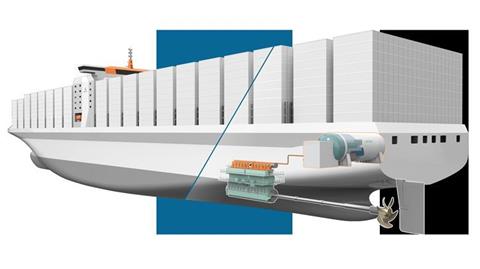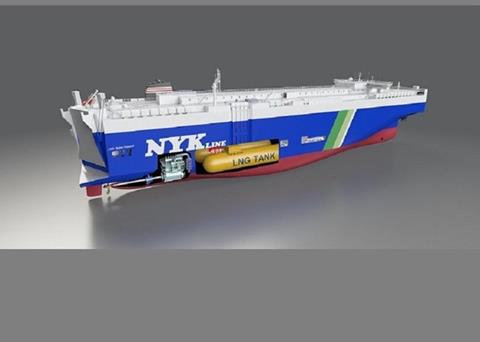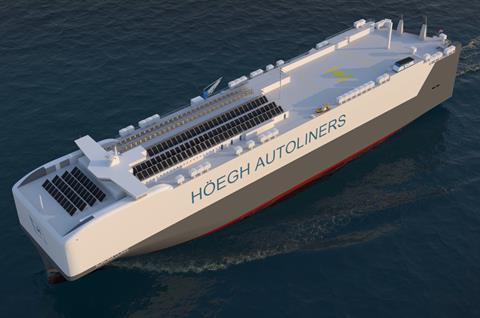Hybridisation and future fuels are the dominant themes behind this year’s shortlist of MS Award nominees, which encompass a wide range of innovative projects.
After last year’s Danish sojourn, The Motorship’s Propulsion & Future Fuels Conference returns to its traditional home in Hamburg on 22-24 November 2022. The event continues to focus on energy efficiency, and advances in propulsion technologies, while the event’s in-depth coverage of LNG and other alternative fuel advances remains highly topical.
The MS Editor’s Award covers collaborative projects that address industry-wide challenges, and are also selected for their potential wider applicability. There is a bias towards commercial projects, and on technologies that may interest operators and ship owners preparing for the introduction of CII.
This year’s shortlist of five nominees have been selected with a focus on innovative projects that will be on the water, or close to commercial production, by November 2022.
As ever, the winning project will be selected by delegates attending The Motorship’s Propulsion & Future Fuels Conference in person. The shortlisted nominees will present their projects in a special session held during the event, while the winner will be determined by a vote from conference delegates.
Höegh Autoliners’ Aurora Class of PCTCs
The first of our nominees is Höegh Autoliners for the world’s first ammonia-ready battery-hybrid pure car and truck carrier, Aurora. The vessel will be the largest and most environmentally sustainable PCTC in operation when it enters service.
The vessel will have DNV’s ammonia-ready notation and will be powered by dual-fuel 2-stroke engines that can run on marine gas oil and LNG. Designed to carry up to 9,100 cars, the multi-fuel and zero carbon ready Aurora Class vessels will be the first in the PCTC segment to be able to operate on zero carbon ammonia.
The vessel also features strengthened decks and enhanced internal ramp systems will enable electric vehicles to be carried on all decks and provide more flexibility for heavier project cargo.
The new class of vessels – Höegh Autoliners has placed an order for a series of 4+8 vessels with China Merchants Heavy Industry – will represent a breakthrough in reaching Höegh Autoliners’ ambitious net zero emissions target by 2040. The first two vessels from CMHI will be delivered in late 2024 followed by two more vessels in the first half of 2025.
Northern Lights LCO₂ project
The second nominee for the award is MAN Energy Solutions for its involvement in the first vessels ordered in connection with a groundbreaking new trade associated with liquid carbon transport and storage.
MAN Energy Solutions will provide four ME-GI engines to power two new liquid-CO₂carriers under construction for the Northern Lights Carbon Capture and Storage (CCS) project in the North Sea. The dual-fuel vessels will make use of other technologies, such as a wind-assisted propulsion system and air lubrication, to reduce carbon intensity by around 34%, compared to conventional systems. The ships are the first of their kind and have the potential to set a new standard for CO₂ shipping on coastal trading routes.
The two 7,500 cubic-metre, liquid CO₂ carriers are under construction at Dalian Shipbuilding Industry on behalf of Northern Lights, the joint venture between Equinor, Shell and TotalEnergies. The delivery of the 130-metre carriers is scheduled for mid-2024.
Northern Lights will create the first ever, cross-border, open-source, CO₂ transport-and-storage infrastructure network, offering European companies the opportunity to store their CO₂ safely and permanently underground.
The newbuilding carriers will be used in the first phase of Northern Lights’ transport-and-storage-infrastructure development.
H₂-fuelled zero emission bulker
Our third nominee for the award is Lloyd’s Register for its involvement in Norwegian ship owner Egil Ulvan Rederi’s zero-emission self-discharging hydrogen-fuelled bulk carrier, With Orca.
LR is collaborating with Egil Ulvan Rederi in the development of a 5,500 dwt self-discharging bulk carrier design, featuring a hydrogen-burning engine as well as a fuel cell system.
The 5,500 dwt self-discharging bulk carrier design features a hydrogen-burning engine as well as a fuel cell system. With Orca is intended to be fully zero-emission in all operations. The vessel will also have a fuel cell system for energy production in low load conditions, while the vessel is intended to generate much of its energy directly from the wind through two large rotor sails.
The vessel also features a specially designed hull, with an optimised keel and custom rudder solution, which will make it possible to increase the amount of energy generated from the wind. The vessel also has the ability to store excess energy in batteries.
The vessel, designed by Norwegian Ship Design, is planned to enter into a long-term transport contract with cargo owners Felleskjøpet Agri and Heidelberg Cement. It is scheduled to enter operation in early 2024.
2-Stroke Future Fuels Conversion platform
The fourth nominee is a Wärtsilä retrofit-optimised solution to convert existing 2-stroke electronically-controlled engines to run on either LNG, methanol or ammonia. The ground-breaking technology will be applied on a 13,000 teu MSC containership to convert it first (2023) to LNG and later (2024) to ammonia.

Wärtsilä is partnering with MSC to trial the multi-fuel retrofit concept on a 13,000 teu containership.
The platform’s medium-pressure combustion technology combines the high compression ratio of a Diesel cycle engine without the bulky, expensive fuel supply components, and the simplicity and low energy demand of Otto cycle, without the methane slip (≤0.3 g/kWh).
The concept includes an innovative cryogenic fuel supply system. Cryogenic LNG is supplied directly to the engine at around -150oC and at low pressure, rather than heating it to around 40oC as is done for other engine technologies. This eliminates the need for expensive, energy-demanding and high-maintenance compressors, pumps and heat exchangers and means the footprint of the fuel supply system is minimal, maximising installation flexibility for retrofitting vessels in service. The multifuel supply system also offers redundancy and operational flexibility and reliability, with the capability of switching to use conventional liquid fuels such as HFO, MDO or VLSFO.
NYK Line’s first battery-hybrid LNG-fuelled PCTCs
The fifth nominee is WinGD for its role in the development of NYK Line’s first LNG battery hybrid pure car and truck carriers (PCTCs). The series of four vessels are under construction at China Merchants JinLing Shipyard (Nanjing) and are scheduled for delivery in 2023.
The project is noteworthy as WinGD will be responsible for the system integration and system-level energy management, through WinGD’s new X-EL Energy Solutions. This will act as both a supervisory and control system for the overall production and consumption of energy onboard the vessels, ensuring flexibility and optimal operations at sea, in port and during manoeuvring.

NYK Line’s first LNG battery hybrid pure car and truck carriers (PCTCs) are also noteworthy as WinGD will be responsible for the system integration and system-level energy management, through WinGD’s new X-EL Energy Solutions.
The LNG-fuelled PCTCs will be equipped with WinGD 620mm-bore X-DF two-stroke engines, combined with shaft generators, DC-links and battery systems. The vessels’ design mean that the vessels will exceed the IMO’s 2030 target of 40% reduction in carbon intensity upon entry into service. They will also meet the Tier 3 IMO NOx emission limitations coming into force for the Baltic and the North Sea for newbuildings with keel laid on or after 1 January 2021. The vessels are expected to be assigned to transport vehicles mainly between Europe and the Middle East.






